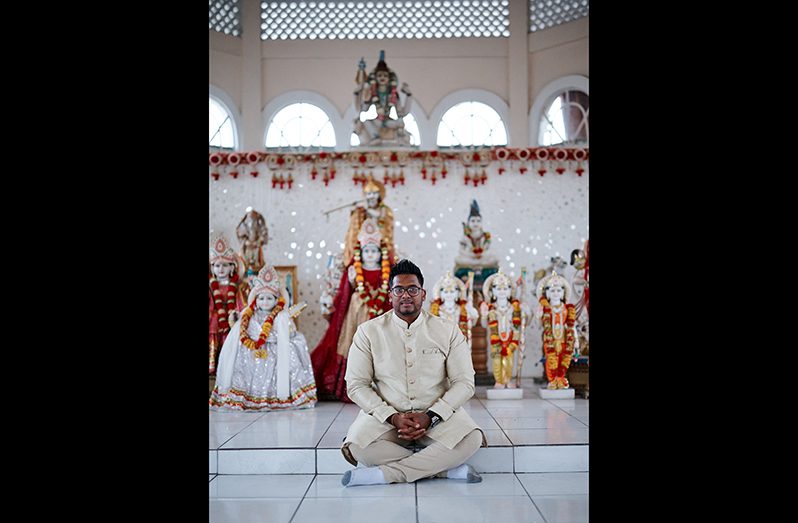Pandit sheds light on Phagwah’s deeper meaning, exploring tradition, roots, and changes
FOR centuries, the vibrant festival of Phagwah, also known as Holi, has been a symbol of joy, renewal, and cultural preservation. But in Guyana, this ancient Hindu celebration has flourished beyond the walls of temples, uniting people of all backgrounds in a spirit of togetherness. As thousands of Guyanese recently took to the streets of their communities to celebrate the festival of colours, Pepperpot Magazine explored the religious and historical significance of this beloved festival.
Pandit Krishna Persaud, a dedicated member of the Guyana Hindu Dharmic Sabha, shared deep insights into the festival’s origins and its evolution in Guyana. He also highlighted the efforts being made to keep its rich traditions alive and just how significant the festival of colours is to a nation as multicultural as this one.
Sitting down with Pepperpot Magazine at the Dharmic Shri Krishna Mandir in Campbellville, Pandit Persaud shared a brief background of the festival and its historical and traditional roots. According to him, the tradition is not only symbolic but also has a firm place in Hindu history. “Phagwah or Holi, whichever we want to call it, originated in the far west. In ancient days, during the golden age of Hinduism, farmers, after finishing their harvest, would gather at a central point to make oblations and offerings into the fire. After making their offerings, they would share their harvest with friends and family and celebrate,” he stated.
Not much has changed since those ancient days. While the festival no longer hosts just farmers, it now sees the participation of everyone in the Hindu faith—and even non-Hindus. To many, Phagwah has become more than a Hindu festival; it has become a national phenomenon. “Phagwah, as we know it today, is not confined to the narrow walls of the temple. Our foreparents brought their culture and beliefs from India, and we have upheld those traditions to this day. Now, Phagwah reaches public spaces, extending to everyone’s doorstep. On Phagwah Day, people of all castes, religions, and ethnicities celebrate together. Today, the message of Phagwah is one of togetherness and cohesion,” he stated.
Across the country, people from all walks of life, regardless of religious beliefs or ethnic backgrounds, recently gathered in the streets, at temples, and in community spaces to participate in the joyous event—or, as Guyanese have coined the celebration, “play Phagwah.” This philosophy is what makes Phagwah so special in Guyana. The festival serves as a reminder that beyond societal labels, people are inherently the same. The mixing of colours on people’s faces is more than just fun—it is a metaphor for the blending of cultures, backgrounds, and histories into one unified celebration.
As Pandit Persaud shared, in many ways, the way the festival is celebrated today is reminiscent of its core significance—unity and togetherness. “Phagwah brings people together. Phagwah brings cohesion. Phagwah brings love. On such a beautiful day, we spread love, we spread joy, and we eliminate all enmity and hatred. We embrace each other regardless of race, religion, or denomination. You can say what you want, you can do what you want, but on Phagwah day, when all of us are smeared with that beautiful colour, you cannot differentiate an Indian from an African, a king from a beggar—everybody looks the same,” he stated.
While Phagwah is widely recognised for its vibrant colours and joyous atmosphere, its origins are also rooted in deep spiritual and cultural significance. The festival is linked to the ancient Hindu tale of Prahlad and Hiranyakashipu, a story that exemplifies faith, resilience, and the triumph of good over evil. According to Hindu scripture, a king named Hiranyakashipu wanted everyone to worship him, but his son Prahlad remained devoted to the Hindu Lord Vishnu. The king’s sister, Holika, who had a magical fireproof cloak, tried to burn Prahlad in a fire. However, the cloak flew off her and onto Prahlad, saving him while she perished in the flames. This is where the tradition of burning Holika originates.
Like many tales of scripture, the story also holds an important lesson—faith and courage, qualities that remain essential in everyday life. As Pandit Persaud shared, even those outside the Hindu faith can learn from the story and carry those lessons into other aspects of life. “One can extract from the story of Prahlad and Hiranyakashipu the importance of faith, devotion, and love for God. Despite suffering and attempts on his life, Prahlad never lost faith in the Supreme. In today’s world, one needs faith, courage, and resilience. Phagwah brings us together and strengthens our faith in these values,” he stated.
Through the years, efforts have been made to ensure that the traditions of Phagwah remain intact and are passed down to younger generations. Pandit Persaud shared that traditions brought from India centuries ago are still practised as authentically as possible today, with some preparations beginning days before Phagwah. “The traditions of Phagwah have remained intact since our foreparents came from India. The day before Phagwah, we celebrate the burning of Holika. The next morning, the head of the village or mandir collects some of the ashes and places a tilak on each person’s forehead, symbolising a new beginning and the elimination of uncertainties and challenges. This tradition remains unchanged, and, in fact, it has become even more beautiful because everyone is involved,” he stated.
Beyond the celebration, organisations are taking active steps to ensure that younger generations remain connected to their heritage and understand the deeper meaning of Phagwah. Various initiatives have been established to teach traditional Hindu practices, including language, music, and religious rituals. Shedding light on just a few of these initiatives, Pandit Persaud shared, “At the Guyana Hindu Dharmic Sabha, we offer many courses and classes to keep young individuals connected to their culture. We have online Hindi and Sanskrit classes, and at this mandir, every Thursday from 5:30 to 6:30 p.m., we teach children the simple hawan and how to read from the scriptures.”
During his talk with Pepperpot Magazine, Pandit Persaud fondly recalled his childhood experiences with Phagwah, highlighting the pure happiness and camaraderie that the festival brings. “One of my fondest memories of Phagwah as a child is waking up to the sound of chowtal singing. The night before Phagwah, I would be so excited that I could hardly sleep. In the morning, I would see all the villagers coming to our home to play Phagwah, applying abir and soaking their skin with coloured water. Every house we visited had delicious delicacies, and we all indulged in them together. That sense of joy, togetherness, and tradition is what makes Phagwah so special,” he shared.
Today, that same excitement still fills the air as Phagwah celebrations continue to bring people together. The festival’s message of unity and love remains relevant, serving as a beacon of hope in an ever-changing world. Guyana’s diverse cultural landscape is enriched by celebrations like Phagwah, which allow individuals from different backgrounds to connect, appreciate, and celebrate together. Beyond the colours, beyond the celebrations, Phagwah is a reminder that togetherness is the true heart of any nation.


.jpg)











